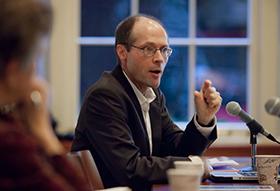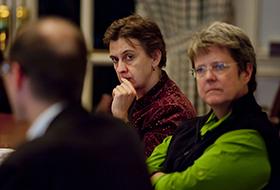U.N. Official Says Gender Equality Improves Food Security
Olivier De Schutter, the U.N. Special Rapporteur on the Right to Food, Calls Improving Women's Rights "Secret Weapon Against Hunger"
New York, October 30, 2013—Improving women’s rights in developing countries increases access to food and nutrition, Olivier De Schutter, the U.N. Special Rapporteur on the Right to Food, told an audience of students, faculty, and visitors at an Oct. 21 event at Columbia Law School.
“This should not surprise us,” De Schutter said. “When women have more say in a household as to how the budget of a family should be spent, more money goes toward meeting the nutritional and health needs of children.”
U.N. Special Rapporteur Olivier De Schutter |
De Schutter’s presentation, “EnGendering Food Security,” was part of the EnGendering Security series conceived by Columbia Law School Professor Katherine M. Franke and sponsored by the Center for Gender and Sexuality Law, which Franke directs. Franke moderated the talk; Katharina Pistor, the Michael I. Sovern Professor of Law at Columbia Law School and director of the Center on Global Legal Transformation, was the respondent.
Educated women make better choices about nutrition and health, De Schutter said, citing a study in which an increase in women’s education over a generation was the strongest factor in reducing hunger in a range of developing countries.
“Forty-three percent of the reduction of hunger during this period was attributable to women’s education being improved,” he said. “That’s more than increases in food availability—26 percent—[and] more than improvements to the health environment—19 percent.”
Women’s rights also influence food security in a more direct way. Globally, men are leaving the agricultural sector and moving to urban centers to scout more profitable work. Women are left behind to run farms, either as small-scale food producers for their families or as hired labor for large plantations.
Among policymakers’ principle concerns is discrimination against women in access to land and title. In many countries, women do not or are not legally able to own land, depriving them of access to credit and other basic economic instruments—and potentially depriving them of the profits of their own labor. Buyers of crops generally transact with “the real or formal owner of the land, in many cases the husband rather than the wife,” De Schutter said.
| Professors Katharina Pistor and Katherine M. Franke |
What scholars call “the feminization of agriculture” also has precipitated a series of other changes that discriminate against women and children. Wages are no longer paid by the day or the week; instead they are based on productivity.
“Of course very often, the rates are calculated on the basis of male productivity standards, and women may not be able to achieve the same results as men,” De Schutter noted. Women often bring their children to work with them to help meet those standards. Agriculture has higher number of child laborers—32 million—than any other industry.
There can be conflicting pressures, Franke, De Schutter, and Pistor observed, between the food security and the women’s rights agendas. Equal economic, educational, and legal rights would allow women more options than low-wage or subsistence farm labor. But a stable global food supply depends precisely on that labor.
“There is a tension here between views of what feminism’s aims might be, and a larger concern about food security and hunger,” said Franke, the Isidor and Seville Sulzbacher Professor of Law.
The final event in the EnGendering Security series, “EnGendering Trauma: On Victims, Witnesses and Testimony,” will be held on Nov. 7.

